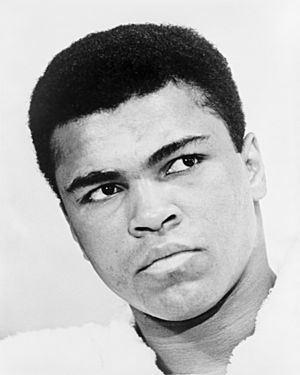Charles Morgan Jr. facts for kids
Quick facts for kids
Charles Morgan Jr.
|
|
|---|---|
| Born | March 11, 1930 |
| Died | January 8, 2009 (aged 78) |
| Education | University of Alabama |
| Occupation | Attorney |
| Known for | Reynolds v. Sims Representing Julian Bond and Muhammad Ali |
Charles "Chuck" Morgan Jr. (born March 11, 1930 – died January 8, 2009) was an American lawyer who worked for civil rights. He was from Alabama. He helped establish the important idea of "one man, one vote" in a big court case called Reynolds v. Sims in 1964. He also represented famous people like Julian Bond and Muhammad Ali in their legal fights.
Contents
Biography
Early Life and Education
Charles Morgan Jr. was born in Cincinnati, Ohio, on March 11, 1930. He grew up in Kentucky. When he was 15, his family moved to Birmingham, Alabama.
He went to the University of Alabama and earned his law degree there. While at college, he met his wife, Camille Walpole.
Fighting for Civil Rights
In September 1963, a terrible bombing happened in Birmingham. Four young girls were killed. The very next day, Charles Morgan spoke out publicly. He bravely told community leaders that they were responsible for the hateful atmosphere in the city.
He said that everyone who contributed to the "popularity of hatred" was guilty. Morgan believed that the whole community shared the blame for the violence. His strong words caused problems for his law practice. He even received threats against his family. Because of this, he had to close his office and move his family out of Birmingham.
Morgan believed strongly in two main things for a fair democracy:
- The right to vote for everyone.
- Equal justice for all citizens, especially Black people in the South.
He supported integration, meaning people of all races living and working together. He did not support separatism, which meant keeping races apart.
Charles Morgan was a Democrat his whole life. He admired Jim Folsom, who was the Governor of Alabama. Folsom believed in integration early on. He once said that if Black people were held back, other poor people would also be held back.
Morgan took on challenging cases. For example, he represented a white minister who was being forced to share records of people who supported human rights. Because Morgan took this case, he faced harassment from the Ku Klux Klan. This made him even more determined in his fight for justice. He defended a Black man accused of murder. He also sued his own university, the University of Alabama, because they would not allow two Black men to attend.
Important Court Cases
In 1964, Morgan helped start the Southern Regional Office for the American Civil Liberties Union (ACLU) in Atlanta. The ACLU is a group that works to protect the rights and freedoms of all Americans.
Later, in 1972, Morgan became a leader for the ACLU in Washington, D.C.. He led the ACLU's efforts to have President Richard Nixon removed from office. He even published a handbook explaining why President Nixon should be impeached. This helped inform the public and members of United States Congress.
One of Morgan's most famous cases was Reynolds v. Sims in 1964. He argued that voting districts in state legislatures needed to be about the same size. Before this, some rural areas had more voting power than larger cities. Morgan's win established the "one man, one vote" principle. This meant that every person's vote should count equally. This helped stop unfair voting district maps called gerrymandering.
Morgan also worked on the White v. Crook case. This case made sure that juries in Alabama included people of all races. It also said that women could not be kept off juries. In another case, Whitus v. Georgia (1967), five death penalty convictions were overturned. This was because the juries were chosen unfairly based on race.
When Julian Bond was stopped from taking his seat in the Georgia House of Representatives, Morgan took his case to the Supreme Court of the United States. He won, and Bond was allowed to take his seat.
Morgan was also part of the legal team for Muhammad Ali. Ali had refused to serve in the Vietnam War because of his religious beliefs. Morgan and the team successfully appealed Ali's conviction to the U.S. Supreme Court.
In 1967, Morgan represented Howard Levy, a military doctor. Levy refused an order because he disagreed with the war. Morgan argued that soldiers could refuse orders if they believed the actions were wrong. Levy was sentenced to prison but was later released.
Morgan left the ACLU in 1976. This was after a disagreement about his public statements on political candidates.
Later Life and Legacy
After leaving the ACLU, Charles Morgan worked in private law practice. He wrote two books about his experiences: A Time to Speak and One Man, One Vote. In A Time to Speak, he described Birmingham as a "dead" city because of the racial issues it faced.
Charles Morgan Jr. passed away on January 8, 2009, at the age of 78. He died at his home in Destin, Florida, due to complications from Alzheimer's disease. His work helped change laws and make America a fairer place for everyone.
Works
- Charles Morgan: A Time to Speak, New York : Holt, Rinehart an Winston, 1964, ISBN: 0-03-013956-2
 | Kyle Baker |
 | Joseph Yoakum |
 | Laura Wheeler Waring |
 | Henry Ossawa Tanner |


